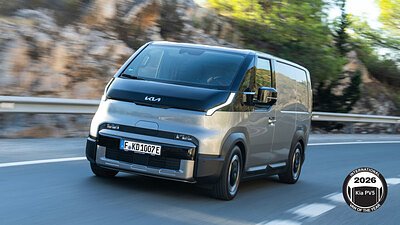
Kia Disrupts Van Market with Innovative All-Electric PV5, Claims First IVOTY Win
Kia’s groundbreaking all-electric PV5 van has secured the prestigious International Van of the Year award, signaling a shift in the commercial vehicle landscape. The win validates Kia's ambitious push into the electric LCV market and signals growing competition for established players.
Kia Disrupts Van Market with Innovative All-Electric PV5, Claims First IVOTY Win
NEW YORK, NY – November 20, 2025
A New Contender Emerges
Kia Corporation has achieved a landmark victory, winning the coveted 2026 International Van of the Year (IVOTY) award for its all-electric PV5 van. This is a first not only for Kia but for any Korean manufacturer, marking a significant disruption in a market traditionally dominated by European and American automakers. The unanimous decision by the 26-member IVOTY jury underscores the vehicle’s innovative design, technological advancements, and potential to reshape the commercial vehicle sector.
“This award isn't just about recognizing a single vehicle; it's about acknowledging a company's commitment to reimagining mobility,” stated an industry analyst familiar with the IVOTY judging process. “Kia has clearly demonstrated that it’s not afraid to challenge the status quo.”
Beyond Cars: Kia's Ambitious PBV Strategy
The PV5’s victory is deeply intertwined with Kia’s broader strategic shift towards Platform Beyond Vehicle (PBV). Recognizing the growing demand for customized, purpose-built commercial vehicles, Kia has invested heavily in developing a modular platform—E-GMP.S—capable of accommodating a wide range of body styles and configurations. The PV5 is the first model built on this platform, paving the way for a diverse lineup of electric vans, chassis cabs, and specialized vehicles.
This move reflects a broader industry trend. The global electric Light Commercial Vehicle (eLCV) market is projected to reach approximately 13.5 million units by 2034, with a CAGR of 36.12% from 2025. Europe and Asia-Pacific are the primary drivers of this growth. “The demand for electric commercial vehicles is exploding, driven by factors like stricter emissions regulations, the rise of e-commerce, and the need for more efficient last-mile delivery solutions,” noted a supply chain expert. “Companies like Kia that can offer flexible, sustainable, and cost-effective solutions are well-positioned to succeed.”
Kia’s ambitions extend beyond simply manufacturing vehicles. The company is establishing a dedicated PBV Conversion Center to facilitate customization and tailor vehicles to meet specific customer needs. This commitment to flexibility and customization is a key differentiator in the increasingly competitive eLCV market.
Innovation in Manufacturing: A New Approach to Production
Supporting this ambitious product strategy is a revolutionary manufacturing approach. Kia’s new Hwaseong EVO Plant utilizes a unique “conveyor and cell integrated manufacturing system.” This system combines the efficiency of a traditional conveyor line with the flexibility of cell-based production, enabling the simultaneous manufacture of different PBV models and configurations on the same line.
This approach significantly reduces production time and costs, while also enhancing quality and customization. The plant incorporates advanced automation technologies, including smart logistics systems and AI-powered robotic arms, but also prioritizes a human-centric work environment. “The key is to combine the best of both worlds—the efficiency of automation with the creativity and expertise of human workers,” explained a manufacturing engineer familiar with the plant’s design.
Kia also plans to utilize renewable energy sources, including a 50 MW solar power generation facility, to minimize the plant’s carbon footprint. This commitment to sustainability aligns with the company’s broader environmental goals.
Challenging the Established Order
The PV5’s technical specifications further underscore its potential to disrupt the market. Available with multiple battery options (51.5 kWh, 71.2 kWh, and a 43.3 kWh LFP option) and a range of up to 416 km (WLTP), the van offers competitive performance and versatility. Its modular design allows for various configurations, including passenger vans, cargo vans, chassis cabs, and specialized vehicles. The PV5 also boasts a payload capacity of up to 1,005 kg, making it suitable for a wide range of commercial applications.
While established players like Ford and Mercedes-Benz have made significant strides in the electric van segment, the PV5 offers a compelling alternative. With its innovative design, flexible platform, and commitment to sustainability, Kia is poised to become a major force in the eLCV market. “Kia is no longer just a follower; they are a true innovator,” said a transportation industry consultant. “The PV5 is a game-changer, and it will force other automakers to up their game.”
The PV5's Guinness World Record for the greatest distance travelled by a light-duty battery-powered electric van with maximum payload on a single charge (693.38 km with a 71.2 kWh battery and 665 kg payload) further solidifies Kia's position as a leader in electric van technology.
Kia’s commitment to offering not just a vehicle, but a fully customizable mobility solution, signals a new era in commercial transportation.
